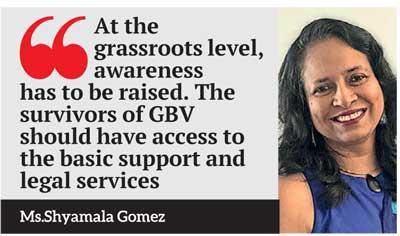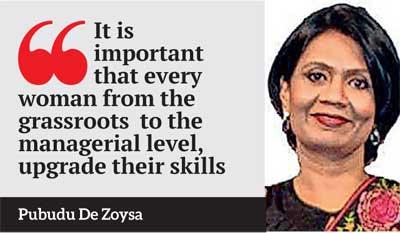25 Dec 2020 - {{hitsCtrl.values.hits}}
According to the UN, one in three women experiences physical and/or sexual violence especially in the form of  intimate partner violence. However, data collected during the pandemic shows that gender-based violence (GBV) against women has intensified during the pandemic, globally. The WHO South- East Asia region press release points out that limitations on movement due to the lockdown can keep women in close proximity with their abusers and isolated from support services, in situations of increased economic and psychological stress. Loss of livelihoods have also caused women to become more vulnerable and dependent. It reveals that the risk to women and girls is at a time when social protection services to respond to violence such as hotlines, shelters and legal aid have been disrupted in many areas. In lieu of the 16 Days of Activism against Gender Based Violence, USAID Social Cohesion and Reconciliation Activity (SCORE) organised a webinar “Transformative Role of Women during COVID-19 and Beyond: Challenges & Opportunities”, which was held recently.
intimate partner violence. However, data collected during the pandemic shows that gender-based violence (GBV) against women has intensified during the pandemic, globally. The WHO South- East Asia region press release points out that limitations on movement due to the lockdown can keep women in close proximity with their abusers and isolated from support services, in situations of increased economic and psychological stress. Loss of livelihoods have also caused women to become more vulnerable and dependent. It reveals that the risk to women and girls is at a time when social protection services to respond to violence such as hotlines, shelters and legal aid have been disrupted in many areas. In lieu of the 16 Days of Activism against Gender Based Violence, USAID Social Cohesion and Reconciliation Activity (SCORE) organised a webinar “Transformative Role of Women during COVID-19 and Beyond: Challenges & Opportunities”, which was held recently.
 In 2019, the Department of Census and Statistics conducted an all-island‘Women’s Wellbeing Survey’ with over 2,200 participants who were females of the age 15 and above. This survey found out that one in five women had experienced physical and/or sexual violence by an intimate partner while, 39.8% were reported to have experienced physical, sexual, emotional and/or economic violence by an intimate partner. Referring to these statistics, Rebecca Surenthiraraj – Senior Researcher at the Social Scientists Association (SSA) shared that despite various awareness- programmes, violence against women persists because it has become a societal norm for women and girls to be dominated by men. “Almost half of the women agreed with the statement that ‘men should show that he is the boss’ and that ‘a good wife listens to her husband even when she disagrees’. Two in five women also agree that a woman should have sex with her husband even if she doesn’t feel to indulge. Such statistics are shocking. These show how much of a problem GBV prevail in the country,” she said. She also revealed that globally there was a 20%- 30% increase in domestic violence, within a month of a lockdown. “In Sri Lanka, there might have been a fourfold increase,” she stated.
In 2019, the Department of Census and Statistics conducted an all-island‘Women’s Wellbeing Survey’ with over 2,200 participants who were females of the age 15 and above. This survey found out that one in five women had experienced physical and/or sexual violence by an intimate partner while, 39.8% were reported to have experienced physical, sexual, emotional and/or economic violence by an intimate partner. Referring to these statistics, Rebecca Surenthiraraj – Senior Researcher at the Social Scientists Association (SSA) shared that despite various awareness- programmes, violence against women persists because it has become a societal norm for women and girls to be dominated by men. “Almost half of the women agreed with the statement that ‘men should show that he is the boss’ and that ‘a good wife listens to her husband even when she disagrees’. Two in five women also agree that a woman should have sex with her husband even if she doesn’t feel to indulge. Such statistics are shocking. These show how much of a problem GBV prevail in the country,” she said. She also revealed that globally there was a 20%- 30% increase in domestic violence, within a month of a lockdown. “In Sri Lanka, there might have been a fourfold increase,” she stated.
“Even backlash is a type of violence.”
Ms.Surenthiraraj noted that due to the COVID- 19 pandemic, migrant workers and garment factory workers had also faced violence in terms of lack of rights and access to proper healthcare. “Migrant workers, despite being the largest foreign remittance earners are often spoken of in a demeaning manner and their rights were not fully protected. When they were being repatriated, many Sri Lankans saw them as people who brought in the COVID- 19 to Sri Lanka.They were seen as means of increasing the COVID- 19 infected headcount. The negativity had caused delays in repatriation and led to them not having a safe place to stay and avail access to proper health care. They also had no income. Meanwhile, garment factory workers were seen as people who were instrumental in starting the second wave. These women were ostracized in their communities. They also faced a lot of backlash on social media,” she shared adding that the backlash was also a type of violence.
She stated that gender alone should not be considered in this aspect, as there were various categories that should be taken into consideration when discussing about violence. “There are various dichotomies and hierarchies that make it difficult for women to live their fullest and contribute to their life and the economy meaningfully,” she opined.
“There is a massive lack of support for women facing any form of GBV.”
Ms.Shyamala Gomez, the founder and executive director of the Centre for Equality and Justice (CEJ), noted that the increase in the number of reporting of GBV was due to more women willing to come forward to report. But, she also noted that though there were support services, it was not adequate. “We have shelters but they are not enough. There is a lack of access for legal services. The state needs to increase the number of services we have and enhance them to be able to address the current situation of domestic violence and other forms of GBV,” she stated, adding that the NGOs and non-state sectors had done what they were able to, with the limited support they received. She shared that in countries like Spain and Portugal, GBV was being dealt by addressing it as an essential service during the pandemic.
"The WHO South- East Asia region press release points out that limitations on movement due to the lockdown can keep women in close proximity with their abusers and isolated from support services"
“At the grassroots level, awareness has to be raised. The survivors of GBV should have access to the basic support and legal services,” she said suggesting that midwives could go to various houses and check the status of the women in the house, as midwives have a close connection with the community. “Young boys and men too should be engaged while addressing GBV,” she said.
Ms.Gomez also pointed out that during the present pandemic, women were more vulnerable towards sexual  bribery. “If a woman is not accompanied by a male relative while accessing services like getting a deed or even an electricity connection, public officials tend to ask them for sexual forms of bribery,” she said adding that the CEJ have been working towards reforms to recognise sexual bribery in the Bribery Act.
bribery. “If a woman is not accompanied by a male relative while accessing services like getting a deed or even an electricity connection, public officials tend to ask them for sexual forms of bribery,” she said adding that the CEJ have been working towards reforms to recognise sexual bribery in the Bribery Act.
“There should be a structural change within the system.”
Rehaan Jayawickreme, Chairman of the Weligama Urban Council, stated that the increased incidents of GBV were due to the fault of the system. “In Weligama, most of the fishermen are only educated up to Grade 5 or Grade 8 and they marry girls who are between the ages of 15- 16 years. These girls and women also get abused by their husbands and don’t complain to the police about it as they are laughed at, in police stations. Such is the situation. Therefore, there should be a structural change from within,” he said suggesting that from the pre-school onwards, children should be taught about gender equality. “Children grow up seeing fathers abusing their mothers and think that it is a done thing. This attitude should be changed very early on,” he said, adding that there should resources within the system to tackle child marriage, teen pregnancy and GBV.
“Women should upgrade their skill set,”
Noting that women being dependent increased their vulnerability towards GBV, Pubudu De Zoysa, the District Governor of Sri Lanka and Maldives for Rotary International District 3220 (2022- 2023), stated, that the pandemic had also increased entrepreneurial opportunities for women. “There is an increase of home delivery- based organisations, therefore women possessing the necessary skill-set can engage in such vocation.” She added that since e-commerce was also on a rise during the pandemic, women should upgrade their skills to face those changes and become less vulnerable. “It is important that every woman from the grassroots to the managerial level, upgrade their skills,” she reiterated.
Her views were also shared by Dr. Areeb Abdulrazaq Ahmed, a member of the Arab Group of Good Governance. He stated that in Yemen, women- led organisations were able to help out poor families by collecting funds. “During these times of pandemic, women have shown their leadership skills and sense of responsibility.” However, he noted that in some countries, extremist religious groups hindered the progress of women bringing various limitations and were negatively stereotyping women. “To avoid all of this, there should be gender- responsive legal reforms,” he said.
A global perspective
Ms.Betty Adera, founder and executive director of Betty Adera Foundation, stated that through her foundation, survivors of GBV were empowered to occupy positions of decision making within their communities and at a regional level in Kenya. “When the pandemic hit, they created awareness regarding health and hygiene to women in slums. They also advise the government on important measures that affect women and girls. They encourage other survivors to speak up as well,” she shared, stating that survivors of GBV had a critical role to play in preventing, creating awareness and mitigating GBV.
Ms.Sushmita Mukherjee, Director of Gender and Adolescent Girls at Project Concern International India, suggested that all the solutions for GBV should address patriarchal, normative and regressive societal norms. She reiterated the suggestion brought forward by the other panellists adding that children as young as six years of age should understand their rights and violations of rights. She also pointed out that it was important to understand why people such as the neighbours failed to notify authorities if a woman was subjected to violence. “We should see why and how the social fabric has broken down when women are subjected to violence,” she said, adding that it was the responsibility of both genders to mitigate GBV.
27 Nov 2024 1 hours ago
27 Nov 2024 2 hours ago
27 Nov 2024 4 hours ago
27 Nov 2024 5 hours ago
27 Nov 2024 5 hours ago